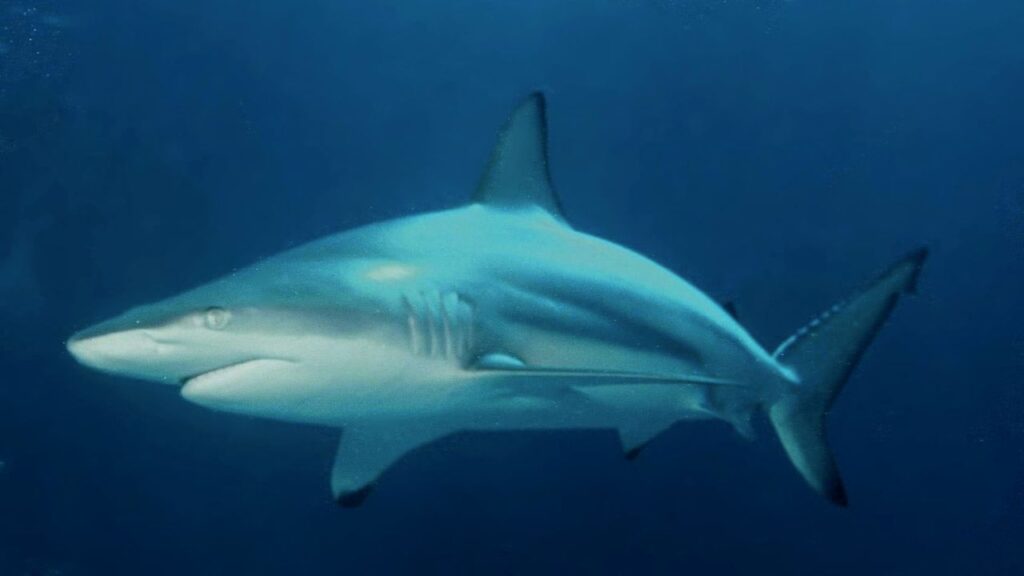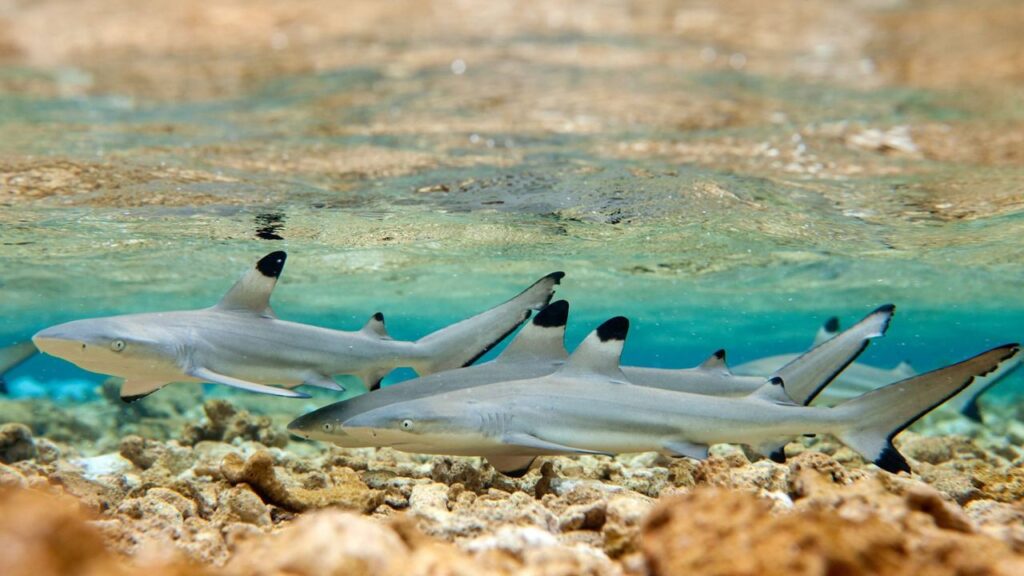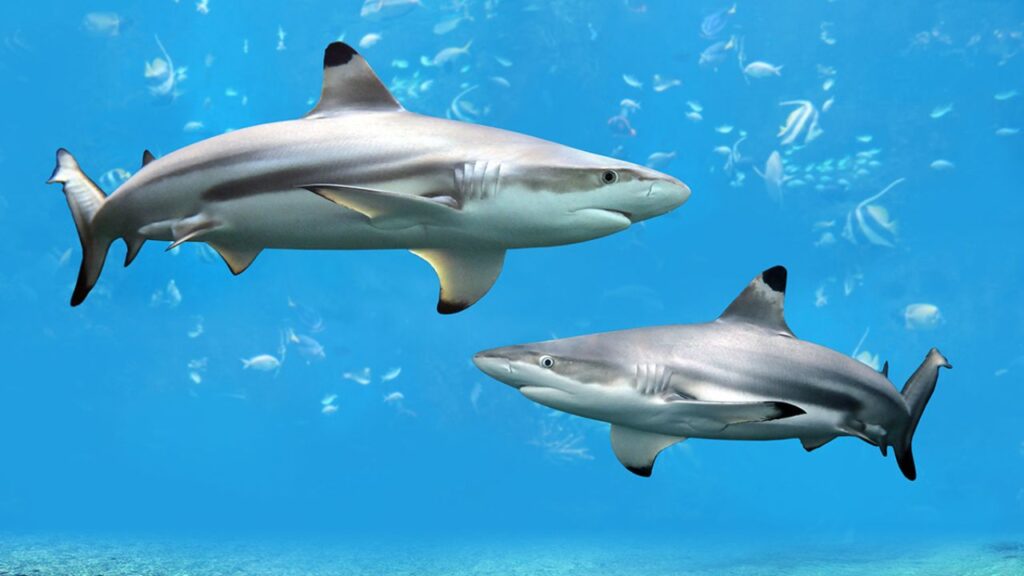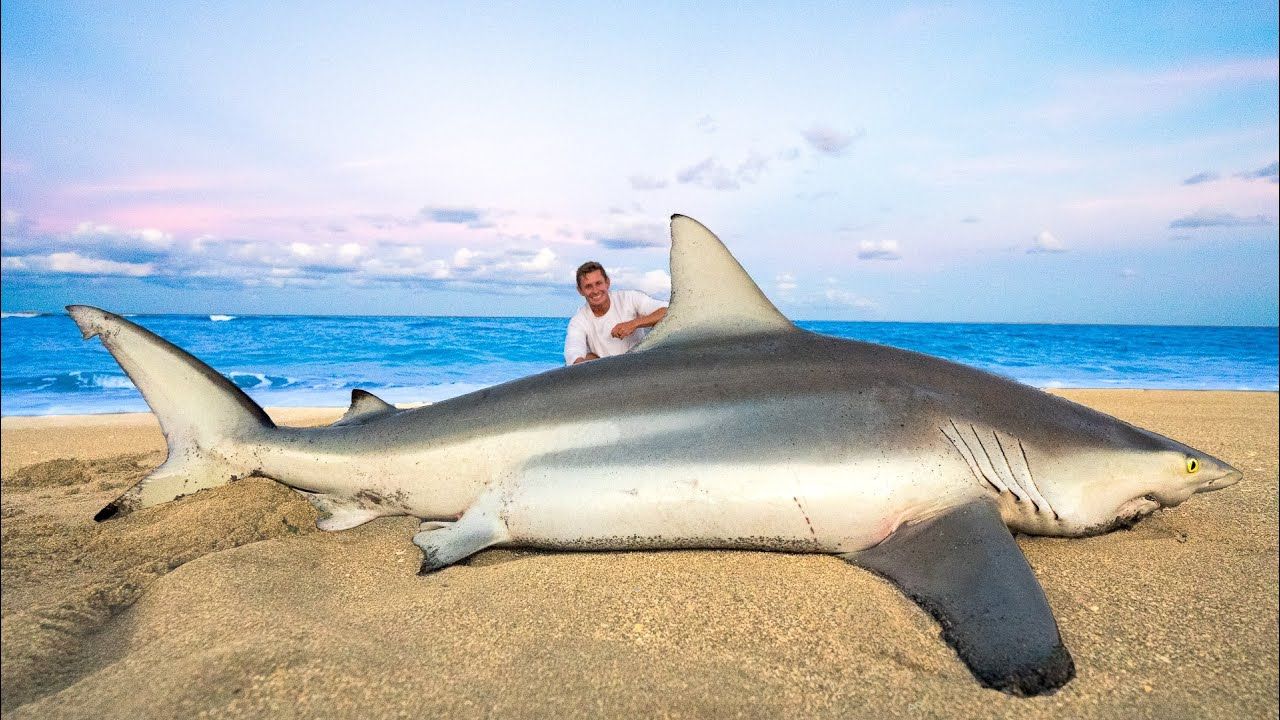Last updated on November 11th, 2024 at 03:38 pm
Do Blacktip Sharks Attack Humans? Blacktip sharks rarely attack humans, typically only when they mistake them for prey in murky waters.
The ocean is a place of wonder, teeming with life, mystery, and beauty. Among the many creatures that inhabit the seas, sharks often evoke a sense of fear and fascination. Blacktip sharks, with their sleek bodies and distinctive black-tipped fins, are no exception.
They are one of the most commonly encountered sharks by humans, especially in coastal waters where people often swim, surf, and dive. However, this proximity raises an important question: Do blacktip sharks pose a real threat to humans?
In this comprehensive article, we will explore the behavior of blacktip sharks, the likelihood of attacks, and what you can do to stay safe while enjoying the ocean.
Contents
- 1 What Are Blacktip Sharks?
- 2 Do Blacktip Sharks Attack Humans?
- 3 Are Blacktip Shark Attacks Dangerous?
- 4 How to Avoid Blacktip Shark Attacks?
- 5 Final Verdict
- 6 FAQs
- 6.1 1. How often do blacktip sharks attack humans?
- 6.2 2. What should I do if I see a blacktip shark while swimming?
- 6.3 3. Are blacktip sharks protected species?
- 6.4 4. Can blacktip sharks be kept in aquariums?
- 6.5 5. What is the difference between a blacktip shark and a blacktip reef shark?
- 6.6 6. Do brown sharks attack humans?
- 6.7 7. Do reef sharks attack humans?
- 7 Conclusion: Do Blacktip Sharks Attack Humans?
What Are Blacktip Sharks?
Physical Characteristics
Blacktip sharks (Carcharhinus limbatus) are medium-sized sharks, typically growing to about 5 to 6 feet in length and weighing up to 125 pounds. They are easily recognizable by the black tips on their dorsal, pectoral, and caudal fins, which give them their name.
Their bodies are streamlined, with a grayish-brown color on top and a white underside, which helps them blend into their surroundings when viewed from above or below.
This counter-shading is a common trait among many marine animals, as it provides camouflage from predators and prey alike.
These sharks are found in warm, shallow waters around the world, particularly in tropical and subtropical regions. [Do Blacktip Sharks Attack Humans?
They are commonly spotted along the coasts of North and South America, Africa, and Asia, where they inhabit estuaries, lagoons, and coral reefs. Blacktip sharks are known to migrate seasonally, often moving closer to shore during the warmer months and returning to deeper waters as temperatures drop.
Behavior and Diet
Blacktip sharks are known for their active and agile behavior. They are social animals, often seen in groups, especially when hunting or during the mating season.
These sharks are fast swimmers and are capable of making sudden, acrobatic leaps out of the water when chasing prey. This behavior, known as “breaching,” is a spectacular sight and is often observed when blacktip sharks are feeding on schools of fish.
The diet of blacktip sharks primarily consists of small fish, such as mullet, sardines, and herring, as well as squid and crustaceans. [Do Blacktip Sharks Attack Humans?
They are opportunistic feeders and will often follow schools of fish, taking advantage of the abundance of food. Blacktip sharks are also known to feed near the surface, which sometimes brings them into close contact with human activities such as fishing, swimming, and surfing.
Despite their predatory nature, blacktip sharks are generally not aggressive toward humans. They are more likely to flee when approached, and most interactions with people occur when the sharks are hunting or foraging for food in areas where humans are present.

Do Blacktip Sharks Attack Humans?
Incidence of Attacks
The question of whether blacktip sharks attack humans is one that often arises among beachgoers and ocean enthusiasts. While it is true that blacktip sharks have been involved in unprovoked attacks on humans, such incidents are relatively rare.
According to the International Shark Attack File (ISAF), blacktip sharks are responsible for a small percentage of the total number of shark attacks worldwide. Most of these incidents occur in shallow waters where sharks and humans are more likely to come into contact.
The majority of blacktip shark attacks are non-fatal, with injuries typically involving minor bites. These attacks are often described as “hit and run” incidents, where the shark bites and then quickly retreats.
This behavior suggests that the shark may have mistaken the person for prey, but upon realizing its mistake, it disengages and swims away.
In most cases, the injuries caused by blacktip shark bites are relatively minor and do not result in serious harm. [Do Blacktip Sharks Attack Humans?
Reasons for Attacks
There are several reasons why blacktip sharks might attack humans, though these instances are generally rare and often accidental. The most common reason is mistaken identity.
In murky waters, where visibility is poor, a blacktip shark might mistake a swimmer, surfer, or diver for a fish or other prey. This is especially likely in areas where sharks are actively feeding, as the splashing and movement of a person in the water can resemble the behavior of a struggling fish.
Another reason for blacktip shark attacks could be curiosity. Sharks are naturally curious animals, and they often investigate unfamiliar objects in their environment by biting or nudging them.
This exploratory behavior is not typically aggressive and is more of a way for the shark to gather information about its surroundings. [Do Blacktip Sharks Attack Humans?
Environmental conditions also play a role in the likelihood of an encounter. Factors such as the time of day, water temperature, and the presence of baitfish can influence the behavior of blacktip sharks. For example, early morning and late afternoon are times when sharks are most active, as they are often hunting for food during these periods.
Swimming in areas where baitfish are present can also increase the chances of an encounter, as sharks may be drawn to the area by the abundance of prey.
Famous Incidents
While blacktip shark attacks are infrequent, there have been notable incidents that have brought attention to this species. [Do Blacktip Sharks Attack Humans?
One of the most well-known cases occurred during the summer of 2001, when a series of shark attacks off the coast of Florida made headlines around the world. Some of these attacks were attributed to blacktip sharks, leading to heightened public fear and concern about the safety of swimming in the ocean.
However, experts were quick to point out that such occurrences were anomalies and that blacktip sharks are generally not a significant threat to humans.
In another incident, a blacktip shark was involved in a highly publicized attack on a surfer in North Carolina in 2015. The surfer, who was paddling near the shore, was bitten on the foot and hand, sustaining minor injuries.
The incident received widespread media coverage, but it was later determined that the shark had likely mistaken the surfer’s foot for a fish. [Do Blacktip Sharks Attack Humans?
The quick response of the surfer and nearby lifeguards helped to prevent the situation from escalating, and the victim made a full recovery.
These incidents, while concerning, are not representative of the typical behavior of blacktip sharks. Most encounters between humans and blacktip sharks are harmless, with the sharks either ignoring people or quickly swimming away when they realize there is no food to be had.

Comparison with Other Shark Species
When compared to other shark species known for attacks on humans, blacktip sharks are relatively low on the list of threats. Great white sharks, for example, are responsible for the majority of fatal shark attacks globally.
These apex predators are known for their powerful bites and have been involved in some of the most notorious shark attacks in history. Similarly, bull sharks and tiger sharks are also considered more dangerous due to their aggressive nature and frequent presence in areas where humans swim.
In contrast, blacktip sharks are much less likely to pose a serious threat to humans. Their smaller size, less aggressive behavior, and preference for smaller prey make them less dangerous than their larger cousins.
While any shark encounter should be treated with caution, the likelihood of a blacktip shark attack resulting in serious injury or death is extremely low. [Do Blacktip Sharks Attack Humans?
Are Blacktip Shark Attacks Dangerous?
Nature of Injuries
The injuries resulting from blacktip shark attacks are usually minor and involve small, shallow bites. These bites often occur on the legs, feet, or hands, as these are the body parts most exposed while swimming or surfing.
The nature of the bite is often quick and superficial, causing cuts or puncture wounds rather than deep lacerations. In some cases, the shark may only make contact with the skin without breaking it, resulting in bruising rather than a bite wound.
In rare cases where a blacktip shark does inflict a more serious injury, it is often the result of the shark biting down harder or making multiple attempts to investigate the perceived prey.
However, even in these instances, the injuries are generally not life-threatening and can be treated with standard medical care. [Do Blacktip Sharks Attack Humans?
Medical Treatment and Recovery
If a blacktip shark bite occurs, immediate medical attention is necessary to clean the wound and prevent infection. Although the injuries are typically not severe, there is always a risk of bacterial infection from the ocean water.
Treatment generally involves cleaning the wound, possibly suturing deeper cuts, and administering antibiotics to prevent infection. In some cases, a tetanus shot may also be recommended, particularly if the wound is deep or the person has not been vaccinated recently.
Recovery from a blacktip shark bite is usually straightforward, with most victims returning to normal activities within a few weeks. Physical therapy may be required for more severe injuries, particularly if the bite has affected muscles or tendons.
However, the long-term prognosis for blacktip shark bite victims is generally excellent, with minimal scarring or lasting effects. [Do Blacktip Sharks Attack Humans?
How to Avoid Blacktip Shark Attacks?
Safety Tips for Swimmers and Divers
To minimize the risk of an encounter with a blacktip shark, it’s essential to follow some simple safety tips:
- Avoid swimming in areas where sharks are known to frequent, especially near fishing piers, river mouths, or in waters with schools of fish. These locations are prime hunting grounds for sharks, and entering the water in these areas increases the chances of an encounter.
- Refrain from swimming at dawn or dusk, as sharks are more active during these times. These periods coincide with the sharks’ feeding times, and the low light conditions can make it more difficult for sharks to distinguish between prey and people.
- Stay in groups when swimming, as sharks are more likely to attack solitary individuals. Swimming in a group reduces the likelihood of being singled out by a shark, as larger groups present a more intimidating presence.
- Avoid wearing shiny jewelry or brightly colored clothing, as these can attract sharks by resembling fish scales. The reflection of light off jewelry can mimic the glint of fish scales, potentially drawing a shark’s attention.

Recognizing Warning Signs
If you are in the water and notice fish behaving erratically or birds diving into the water to catch fish, this could be a sign that sharks are feeding nearby.
Schools of fish may exhibit frantic or erratic movements when predators are present, and seabirds often gather around these areas to take advantage of the feeding frenzy.
It’s also wise to be cautious if you see a shark fin breaking the surface of the water. In such cases, calmly and slowly exit the water without splashing, as sudden movements might attract the shark’s attention.
Local Guidelines and Warnings
Always pay attention to local beach warnings and guidelines. Many beaches with known shark activity have lifeguards who monitor the water and post signs or warnings if sharks are spotted. Following their advice can significantly reduce the risk of a shark encounter.
Additionally, some beaches have implemented shark monitoring programs that use drones, spotter planes, or underwater sonar to detect shark activity. [Do Blacktip Sharks Attack Humans?
If you are visiting a beach with such a program in place, it’s a good idea to familiarize yourself with how the alerts are communicated and what to do if a shark is spotted.
Equipment and Technology
Several technologies and pieces of equipment are designed to deter sharks. For example, shark deterrent devices that emit electrical pulses or magnetic fields can be worn by swimmers or attached to surfboards.
These devices create a sensory barrier that can deter sharks from approaching too closely. While not foolproof, these devices have shown promise in reducing the likelihood of a shark getting too close. Additionally, wetsuits with camouflage patterns that break up the human silhouette can also help minimize the risk.
These patterns make it harder for sharks to identify the shape of a person, reducing the chances of a mistaken identity attack. [Do Blacktip Sharks Attack Humans?
Final Verdict
In conclusion, while blacktip sharks are capable of attacking humans, such incidents are rare and typically result from mistaken identity or curiosity. The injuries caused by blacktip sharks are generally minor and non-fatal.
By understanding their behavior and taking basic precautions, you can safely enjoy the ocean without undue fear of these fascinating creatures. [Do Blacktip Sharks Attack Humans?
Blacktip sharks, like many other marine animals, play a vital role in the ecosystem, and respecting their space is key to coexisting with them peacefully.
See Also: Do Leopard Seals Attack Humans? Beneath the Ice!
FAQs
1. How often do blacktip sharks attack humans?
Blacktip shark attacks on humans are infrequent, with most incidents resulting in minor injuries. These attacks are typically non-fatal and occur in shallow waters where sharks and humans are more likely to come into contact.
2. What should I do if I see a blacktip shark while swimming?
If you see a blacktip shark while swimming, remain calm, avoid sudden movements, and slowly exit the water without splashing. Sharks are more likely to investigate if you panic or make rapid movements, so staying calm is crucial.
3. Are blacktip sharks protected species?
Yes, in some regions, blacktip sharks are protected due to their declining population, but regulations vary by location. Conservation efforts are in place to ensure that their populations remain stable, particularly in areas where they are overfished or their habitats are threatened. [Do Blacktip Sharks Attack Humans?
4. Can blacktip sharks be kept in aquariums?
Blacktip sharks can be kept in large public aquariums, but they require significant space and specialized care. Due to their active nature and need for room to swim, they are not suitable for home aquariums and are usually only kept in facilities with the resources to meet their needs.
5. What is the difference between a blacktip shark and a blacktip reef shark?
Blacktip sharks are typically found in open waters, while blacktip reef sharks prefer shallow coral reefs. They also differ slightly in size and appearance, with the blacktip reef shark being smaller and more commonly found in reef environments. Blacktip reef sharks are also more docile and less likely to be encountered in areas frequented by humans.
6. Do brown sharks attack humans?
Brown sharks, or sandbar sharks, are generally not aggressive towards humans and rarely attack. They typically avoid human interaction, with most incidents being accidental rather than predatory.
7. Do reef sharks attack humans?
Reef sharks are typically non-aggressive toward humans and rarely attack. Most encounters are harmless, with attacks usually occurring when the shark feels threatened or provoked.
Conclusion: Do Blacktip Sharks Attack Humans?
Blacktip sharks, with their distinctive black-tipped fins and agile behavior, are more curious than dangerous. While they can and do occasionally bite humans, such incidents are rare and usually not life-threatening.
By taking appropriate precautions and respecting their natural habitat, you can reduce the already low risk of a blacktip shark encounter and appreciate these remarkable creatures from a safe distance.
The ocean is a vast and beautiful place, and with a little knowledge and awareness, you can enjoy all it has to offer while coexisting peacefully with its inhabitants. [Do Blacktip Sharks Attack Humans?

Hello, I am Rosa Ellis, a mother of two and a wildlife blogger. I grew up in New York City, but I love exploring forests. I’ve traveled to places like Yellowstone National Park and the Amazon Rainforest to see animals up close. I know a lot about animal behavior and which animals can be dangerous to humans. Thanks for visiting my blog!

